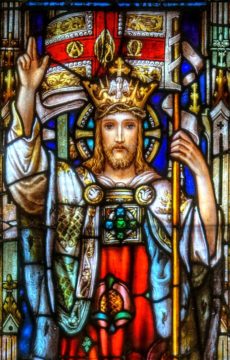As we anticipate the Solemnity of the Lord Jesus Christ King of the Universe, Franciscan spiritual director Fr. Paul Gallagher offers us Gospel Reflections. This content is edited by Franciscan Sister of Christian Charity Sister Anne Marie Lom and Joe Thiel. The excerpts from the Sunday readings are prepared by Joe Thiel. To read or download the complete pdf with excerpts for your prayer, please click here: Franciscan Gospel Reflection November 21 2021. Excerpts are from the Lectionary for Mass for Use in the Dioceses of the United States of America, second typical edition © 2001, 1998, 1997, 1986, 1970 Confraternity of Christian Doctrine, Inc., Washington, DC. Used with permission. All rights reserved. No portion of this text may be reproduced by any means without permission in writing from the copyright owner.
John 18:33b-37
Pilate said to Jesus, “Are you the King of the Jews?” Jesus answered, “Do you say this on your own or have others told you about me?” Pilate answered, “I am not a Jew, am I? Your own nation and the chief priests handed you over to me. What have you done?”
Jesus answered, “My kingdom does not belong to this world. If my kingdom did belong to this world, my attendants would be fighting to keep me from being handed over to the Jews. But as it is, my kingdom is not here.”
So Pilate said to him, “Then you are a king?” Jesus answered, “You say I am a king. For this I was born and for this I came into the world, to testify to the truth. Everyone who belongs to the truth listens to my voice.”
Background:
This is the last Sunday of the liturgical year. Next Sunday is the first Sunday of Advent. Though this has been the year devoted to reading Mark’s gospel, this text is from John’s gospel.
This Solemnity of our Lord Jesus Christ, King of the Universe may feel awkward to many. The title “king” also brings to mind a medieval system of royal entitlement at the expense of unfortunate serfs and servants. Even today in our world, royal families live a lifestyle that few of their fellow countrymen can afford. There are still too many places where those of royalty live a privileged life while the poor continue to struggle for basic survival. Our experience and attitudes toward the title of this feast can also affect how we hear the scripture texts and celebrate this solemnity.
In all the gospels, Jesus has harsh criticism for religious leaders who assume positions and attitudes of superiority. Jesus also rebukes those who see him as the Messiah, those who would want to reestablish the greatness of the Hebrew nation as it was in the days of their great King David. The religious authorities saw Jesus as someone who was presenting himself as the “anointed of God.” Therefore, they saw him as blaspheming. They also believed that such claims would be a threat to Roman authority and would upset the fragile peace that allowed them to function with religious authority while being subjects of Roman rule.
In this gospel, Pilate acts as the one who must determine if Jesus is an authentic threat to the Roman authority that he represents. In his questioning, Pilate asks Jesus directly if he is a king. He is asking Jesus if he believes he is the Messiah. One of the ways people expressed their hope and belief in God was through the image of a future kingdom that would restore God’s order and peace to all of creation. Linked to this image of God’s reign was a ruler, one who would govern with the mind and heart of God. That person, it was understood, would be the only true king.
On one level the gospel text is a dialog between two people who are attempting to speak to one another, but have different ideas of kingship. Pilate, the governor, is trying to determine if Jesus considers himself to be the King of the Jews. If so, is he a member of the religious fringe, or does he have true political aspirations? Should Jesus and his disciples be taken as a threat to the Roman rule? For his part, Jesus never claims that he is a king, but he does represent a kingdom, the reign of God. God’s realm turns the order upside-down. It is built on a ruler who is a servant, who does not order but invites, does not demand to be served but washes the feet of others, and does not demand that others give their life in service but instead gives his life in service for others. In the dialog between Jesus and Pilate, they are trying to speak to each other, but each is speaking from their unique perspective.
Even though Jesus dies disgraced and suffering, the inscription that hung over his head on the cross indicated that Jesus was the “King of the Jews.” In John’s gospel it is often Jesus’ enemies who, although they have no idea of the truth of their words, state the profound truth that John wants his community to know. In the central section of John’s passion account, Jesus is presented as the king. “Then Pilate took Jesus and had him scourged. And the soldiers wove a crown out of thorns and placed it on his head, and clothed him in a purple cloak, and they came to him and said, ‘Hail, King of the Jews!” (John 19:1)
At the end of each liturgical year, the Church closes the year with The Solemnity of our Lord Jesus Christ, King of the Universe. Throughout the year we have been reflecting on gospels where Jesus has been revealing to us who God is in word and deed. He has also been instructing us in what it is to be a disciple of Jesus, the one who came to serve the will of God, His Father. Pilate is trying to sort out who this “King of the Jews” is that stands before him. Even standing before Pilate when his life is in jeopardy, Jesus is true to his role of being servant of the Father.
Reflection Questions:
- When you think of royalty, what moments in history or pieces of news come to mind? What feelings are evoked in you as you recall these bits of news?
- When you think of the title, Lord Jesus Christ, King of the Universe, what images come to mind?
- Recall some of the gospel passages that have been read this past year. Which have been your favorites? How is Jesus Christ the King in those passages, too?
- What do you recall of the royal line of David in salvation’s history? What meaning or significance did he have for the Hebrew people?
- Pretend that you are part of the gospel scene as it unfolds, maybe a scribe who is there to record the dialog, or a soldier, one of those guarding Jesus.What kind of day is it? What sounds are in the air? Are people milling around in the background? Do you see any of Jesus’ followers or any of the pharisees?
Pilate asks Jesus point blank if he is the King of the Jews.
Are you surprised? What feeling goes through you? What happens among those who can hear the questions? Can you hear their comments?
Jesus replies: “Do you say this on your own or have others told you about me?”
What happens within you as you hear this response? What are you thinking? How does Pilate respond with his body, the expression on his face? How do the onlookers respond? Can you hear any of their comments?
“I am not a Jew, am I? Your own nation and the chief priests handed you over to me,”
Pilate says. What do you hear in his words, and what do you see in his gesture, in his face, and in the way he says these words: “What have you done?”
What is Pilate’s mood? What is he really trying to tell Jesus? How do you hear this statement? If you were able, what would you like to say to Pilate at this moment?
“My kingdom does not belong to this world. If my kingdom did belong to this world, my attendants would be fighting to keep me from being handed over to the Jews. But as it is, my kingdom is not here.” How does Pilate seem to hear this statement? What kind of reaction does that bring to those who are listening? What reaction does it evoke from you?
“Then you are a king?” What is Pilate’s mood and his intention as he asks this question? What is going on in you as you listen to their conversation at this point? Can you hear any of the comments from the onlookers?
Jesus responds to Pilate: “You say I am a king. For this I was born and for this I came into the world, to testify to the truth. Everyone who belongs to the truth listens to my voice.” With what intention is Jesus responding to Pilate? Is there hope in his voice that Pilate will understand? How does Pilate hear Jesus’ response? What is his reaction? What are some the comments of those in the crowd? How do they respond? How do you hear what Jesus has just said? What are you feeling?
6. Can you take some time now to talk with God or Jesus about what kind of King Jesus is for you, the kind of follower you would like to be, or what this feast means for you in your relationship to God?



